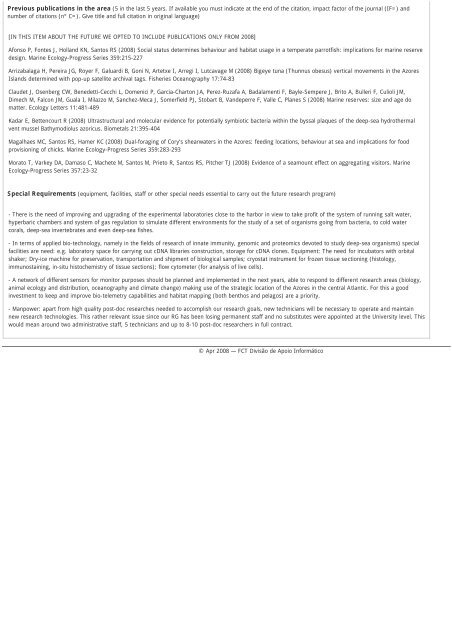2003-2007 - Universidade Técnica de Lisboa
2003-2007 - Universidade Técnica de Lisboa
2003-2007 - Universidade Técnica de Lisboa
You also want an ePaper? Increase the reach of your titles
YUMPU automatically turns print PDFs into web optimized ePapers that Google loves.
Previous publications in the area (5 in the last 5 years. If available you must indicate at the end of the citation, impact factor of the journal (IF=) and<br />
number of citations (n° C=). Give title and full citation in original language)<br />
[IN THIS ITEM ABOUT THE FUTURE WE OPTED TO INCLUDE PUBLICATIONS ONLY FROM 2008]<br />
Afonso P, Fontes J, Holland KN, Santos RS (2008) Social status <strong>de</strong>termines behaviour and habitat usage in a temperate parrotfish: implications for marine reserve<br />
<strong>de</strong>sign. Marine Ecology-Progress Series 359:215-227<br />
Arrizabalaga H, Pereira JG, Royer F, Galuardi B, Goni N, Artetxe I, Arregi I, Lutcavage M (2008) Bigeye tuna (Thunnus obesus) vertical movements in the Azores<br />
Islands <strong>de</strong>termined with pop-up satellite archival tags. Fisheries Oceanography 17:74-83<br />
Clau<strong>de</strong>t J, Osenberg CW, Bene<strong>de</strong>tti-Cecchi L, Domenici P, Garcia-Charton JA, Perez-Ruzafa A, Badalamenti F, Bayle-Sempere J, Brito A, Bulleri F, Culioli JM,<br />
Dimech M, Falcon JM, Guala I, Milazzo M, Sanchez-Meca J, Somerfield PJ, Stobart B, Van<strong>de</strong>perre F, Valle C, Planes S (2008) Marine reserves: size and age do<br />
matter. Ecology Letters 11:481-489<br />
Kadar E, Bettencourt R (2008) Ultrastructural and molecular evi<strong>de</strong>nce for potentially symbiotic bacteria within the byssal plaques of the <strong>de</strong>ep-sea hydrothermal<br />
vent mussel Bathymodiolus azoricus. Biometals 21:395-404<br />
Magalhaes MC, Santos RS, Hamer KC (2008) Dual-foraging of Cory’s shearwaters in the Azores: feeding locations, behaviour at sea and implications for food<br />
provisioning of chicks. Marine Ecology-Progress Series 359:283-293<br />
Morato T, Varkey DA, Damaso C, Machete M, Santos M, Prieto R, Santos RS, Pitcher TJ (2008) Evi<strong>de</strong>nce of a seamount effect on aggregating visitors. Marine<br />
Ecology-Progress Series 357:23-32<br />
Special Requirements (equipment, facilities, staff or other special needs essential to carry out the future research program)<br />
- There is the need of improving and upgrading of the experimental laboratories close to the harbor in view to take profit of the system of running salt water,<br />
hyperbaric chambers and system of gas regulation to simulate different environments for the study of a set of organisms going from bacteria, to cold water<br />
corals, <strong>de</strong>ep-sea invertebrates and even <strong>de</strong>ep-sea fishes.<br />
- In terms of applied bio-technology, namely in the fields of research of innate immunity, genomic and proteomics <strong>de</strong>voted to study <strong>de</strong>ep-sea organisms) special<br />
facilities are need: e.g. laboratory space for carrying out cDNA libraries construction, storage for cDNA clones. Equipment: The need for incubators with orbital<br />
shaker; Dry-ice machine for preservation, transportation and shipment of biological samples; cryostat instrument for frozen tissue sectioning (histology,<br />
immunostaining, in-situ histochemistry of tissue sections); flow cytometer (for analysis of live cells).<br />
- A network of different sensors for monitor purposes should be planned and implemented in the next years, able to respond to different research areas (biology,<br />
animal ecology and distribution, oceanography and climate change) making use of the strategic location of the Azores in the central Atlantic. For this a good<br />
investment to keep and improve bio-telemetry capabilities and habitat mapping (both benthos and pelagos) are a priority.<br />
- Manpower: apart from high quality post-doc researches nee<strong>de</strong>d to accomplish our research goals, new technicians will be necessary to operate and maintain<br />
new research technologies. This rather relevant issue since our RG has been losing permanent staff and no substitutes were appointed at the University level. This<br />
would mean around two administrative staff, 5 technicians and up to 8-10 post-doc researchers in full contract.<br />
© Apr 2008 — FCT Divisão <strong>de</strong> Apoio Informático


